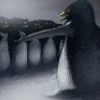Part 1 - Arcane spell-casters.
The four classes of arcane spell-casters have a wide range of spells and feats to choose from. Those choices are critical to the effectiveness of your spell-caster, and need to be made with some idea of your strengths and weaknesses. There are several ways that you can contribute, but it isn?t possible to be good at everything.The classes.
Bard: Bards are true Jack-of-all-Trades. Their spell list includes some spells not available to wizards and sorcerers, and others are available at lower levels. They don?t cast as many spells as the other classes, nor do they gain high level spells as quickly.
Warlock: Warlocks are extremely specialised in what they do. Their main ability is the Eldritch Blast, and most of their other abilities modify it. While they can keep using it indefinitely, there really is very little else they are good at apart from that.
Sorcerers and Wizards: sorcerers and wizards use the same spell list. The difference is that a sorcerer can cast their spells more often and without preparation, but will only know a relatively small number of spells. A wizard can eventually learn all the spells, but they have to decide which ones to use and can?t change this without resting. They do gain high level spells slightly faster than a sorcerer, and they can prepare specific spells that are appropriate for what they will face whereas a sorcerer is stuck with what they already know. Wizards also have extra feats, which they can use to expand their abilities.
Races for Spell-casters.
Humans can be very effective in any class. Sun elves make especially good wizards, though they are more fragile even than most other casters. If you are willing to accept the level adjustment penalty, Aasimar make good sorcerers and tieflings can be capable wizards. Drow can be effective in any of the classes, but their level adjustment means they will always be behind casters from other races. Wood elves are not suited to be wizards; tieflings, shield and grey dwarves and deep gnomes make poor sorcerers and bards; half-orcs are not usually well suited to arcane spell-casting.
Spell-caster Roles.
The Blaster.
One of the more traditional roles, the blaster relies on spells that deal direct damage to enemies. Most of their spells have some effect even if opponents make a saving throw. At their most efficient a blaster can eliminate or seriously weaken a group of enemies before they can do any damage to you. At their worst, their spells do as much damage to you as to your enemies. Sorcerers are good blasters owing to their ability to repeatedly cast the same effects and it is the only things warlocks are good at, while bards have too few damaging spells to be effective in the role.
The best feats for blasters are ones that increase their ability to do damage. Empower spell is extremely useful, Maximise spell is less so but still worthwhile. Spell Penetration and Greater Spells Penetration make it much more likely that your spells will affect powerful creatures which might otherwise resist your spells. Spell Focus will probably be in Evocation if you select it, as most of your spells are Evocations. Avoid the Combat Casting feat, as if enemies are close enough to damage you most of your spells will also affect you.
There are some useful spells at every level. Try to make sure that you don't deal the same type of damage with all your spells, as creatures immune to that sort of damage will ruin your day. At 1st level Magic Missile is a good choice, and Endure Elements cast on your allies will help them survive a misplaced spell. At 2nd level Gedlee's Electric Loop is effective at damaging several enemies, and Web can hold enemies in place for more spells to affect them. At 3rd level you can learn Fireball, but Dispel Magic is probably even more useful for most casters. At 4th level the most useful spell is Greater Invisibility, allowing you to cast from safety against enemies who lack True Seeing, while Ice Storm does both cold and bludgeoning damage. At 5th level Firebrand is effective against any creature vulnerable to fire damage, and Lesser Spell Mantle lets you cast with some degree of safety against enemy spells. At 6th level both Chain Lightning and Isaac's Greater Missile Storm are very effective offensive spells which are worth using with Empower Spell at higher levels. At 7th level Delayed Blast Fireball and Prismatic Spray are both slightly erratic, and Energy Immunity will make your allies happier with you. At 8th level Horrid Wilting is a very useful Necromancy spell, and Polar Ray does a lot of cold damage very quickly. At 9th level Meteor Swarm can end some fights with one casting, and Weird is capable of killing a group of enemies.
Good invocations include Draining Blast and Eldritch Spear; Eldritch Chain; Chilling Tentacles, Devour Magic, and against spell resistant enemies Vitriolic Blast; Retributive Invisibility and Eldritch Doom.
The Booster.
Boosters concentrate on spells that improve the efficiency of their allies and/or reduce the effectiveness of their enemies. A party that has been carefully enhanced is much more likely to win a fight while suffering little damage, whereas one that charges in without preparation will end up suffering more damage even if they are victorious. At the same time it's sometimes wasteful to expend spells on an easy fight. The best class for a Booster is bard because they also gain from their bard songs and inspirations, while warlocks have few useful effects.
The best feats for a Booster are those which increase the amount of time they can keep allies enhanced for. A bard shouldn't be without Extra Music and Lingering Song, and any Booster should take the Extend spell feat. A bard can also look at Augment Healing to make their healing spells more effective. If you concentrate on spells to weaken enemies then Spell Penetration is worth consideration. Since you often find yourself casting spells close to a melee, Combat Casting may be worthwhile.
The effective boost spells at 1st level are Enlarge Person, Magic Weapon and Expeditious Retreat, while Balagarn?s Iron Horn or Ray of Enfeeblement are effective against enemies. At 2nd level, Bull?s Strength is probably the most useful enhancement spell for wizards and Heroism for bards, with either Silence effective against spell-casting enemies. At 3rd level Haste and Displacement are useful boosts, while a bard can use Crushing Despair against a group of enemies and Slow is also valuable. At 4th level Greater Invisibility is valuable for all, while Bards gain War Cry and Wizards gain Stoneskin and Bestow Curse. At 5th level a bard can cast Greater Heroism and Mind Fog, while sorcerers can cast Lesser Mind Blank on warrior allies. At 6th level bards can continually weaken groups of enemies casting Dirge, while wizards have access to Greater Stoneskin. At 7th level Energy Immunity is valuable against some enemies, while at 8th level Mind Blank protects a whole group against mind-affecting spells.
The Enchanter.
Enchanters concentrate on turning enemies against each other to reduce the amount of fighting necessary. They can start fights among enemy groups, compel powerful creatures to fight for them, and cause chaos in enemy ranks. Their spells tend to be either fully effective or useless, and sometimes bad luck will make them totally ineffective. There is also a risk that others actions will break any control they have over an opponent. All arcane casters apart from warlocks can cast the most useful spells. For bards the spells are often lower level, but their slower spell progression means they rarely cast them before a wizard or sorcerer can.
The best feats are Spell Focus and Greater Spell Focus in Enchantment. Spell Penetration is also useful, though most creatures with that can resist spells also have high saving throws. A wizard should also prepare a few scrolls or possibly wands with damage spells in case things go wrong.
Bards can select Charm Person, Sleep and Tasha?s Hideous Laughter at 1st level. At 2nd they can use Cloud of Bewilderment to halt groups of enemies, and also have access to Hold Person. At 3rd level they have both Confusion and Deep Slumber. Their 4th level spells include Dominate Person and Hold Monster. Mind Fog reduces Will saving throws and is essential for any enchanter, and Song of Discord is another valuable 5th level Bard spell. At 6th level they can select Mass Hold Person.
Wizards or sorcerers should select many of the same spells as bards for the role, though they are often higher level when cast by wizards. There are a few additional spells that are useful and aren?t available to bards. Color Spray is a useful 1st level spell, and Feeblemind is very good against other arcane spell-casters. At high levels Mass versions of Charm Monster and Hold Monster are available, as well as Dominate Monster. When successful these last spells are very powerful.
The Summoner.
Some wizards and sorcerers rely on summoned creatures to do their bidding. Unlike enchanters you don?t rely on taking control of creatures already present with the risk that this won?t work. Instead you summon controllable allies. Unfortunately there are spells such as Dismissal and Banishment that can remove large numbers in one casting, and sometimes your creatures aren?t powerful enough to do the job. Bards can cast summons, but their lower spell-casting level means that they often are overpowered, and Warlocks are restricted to summoning undead. Since summoners often end up casting the same spell repeatedly, sorcerers can be more effective than wizards.
The most valuable feats for a summoner are Extend Spell and Augment Summoning. Spell Focus (Conjuration) will be necessary for Augment Summoning. Spell Penetration is less valuable to a Summoner than to most other wizards and sorcerers, since they rarely attack enemies directly. A wizard may want to have Craft Wand, as some spells are repeatedly useful.
A dedicated summoner will get value from learning the relevant Summon Creature spell at every level. They may find a variety of boosting spells useful, or spells that weaken enemies. Area attack spells are likely to damage their own summoned creatures, which makes them less useful. The Planar Binding spells are useful, and Mordenkainen?s Sword resists many spells that can otherwise be effective against your creatures. Gate at 9th level is comparable to Summon Creature IX, and which is more useful depends on the situation.
The Tactical Controller.
Stopping your enemies doing what they want to can be more important than doing what you want to. If you can control the battlefield then you have a big advantage over your enemies. Wizards and sorcerers have a wide range of effects that help them do this. Badly placed, these effects severely restrict their own side?s actions.
Quicken Spell is one of the most valuable feats, allowing you to get an effect off when you need to stop something urgently. Your spells draw from a wide range of schools so Spell Focus is less valuable.
At 1st level the Grease spell can make it much harder for enemies to reach you. Web at 2nd level is possibly your most valuable spell, and Cloud of Bewilderment is also useful. At 3rd level Stinking Cloud is a useful spell, while at 4th you have both Evard?s Black Tentacles and Wall of Fire. Cloudkill and Mind Fog are useful in different ways, with the latter especially helpful for casters with enchantment spells available. Acid Fog is useful because very few creatures are resistant to acid, so forcing them to move or be injured. Bigby?s Grasping Hand controls the movement of a single powerful creature, while Incendiary Cloud is especially valuable against creatures vulnerable to fire such as most undead.
The Warrior:
Few spell-casters want to risk getting into melee and without multi-classing few are capable in the role. Both wizards and sorcerers have low attack bonuses, few hit points, cannot wear armour effectively, and have a limited selection of weapons. Bards and Warlocks are not a great deal better. However, there are ways to can compensate for this to a degree. Many of the spells useful for boosting other party members can also be cast on the mage.
For a bard or warlock, Battle Caster lets them fight in medium armour and if they gain proficiency in medium armour then it?s a very useful ability to boost their armour class. Toughness is valuable for all characters, as are Extend Spell and Combat Casting. Craft Magical Arms and Armour should be part of your repertoire. Still Spell avoids the risk of spell failure.
At 1st level Mage Armour and Enlarge Person increase your hitting power and armour. The combination of Blind Sight and Darkness is helpful for reducing damage, while False Life adds some free hit points, Ghoul Touch is useful offensively, Mirror Image reduces injury, and Protection from Arrows is useful against enemies lacking enchanted missile weapons. Displacement is probably better than Improved Mage Armour, and Vampiric Touch regains hit points for you while damaging enemies. Polymorph Self may sometimes be more effective than attacking in your own form, and Elemental Shield means enemies attacking you will damage themselves in the process. Ethereal Visage is more effective than Stoneskin since it also protects you from some spells, while Stone Body has useful effects. Shadow Shield adds to your armour class and makes you invulnerable to many dangerous effects. Iron Body and Blackstaff are effective in different ways, and at 9th level Shapechange makes you the equal of most warriors.
Prestige classes for arcane spell-casters.
Several prestige classes exist which either require the ability to cast arcane spells or which add to your ability to cast arcane spells. Some of these are more suited for certain types of caster. Warlocks gain very little from them, as none improve their Eldritch Blast ability.
Arcane Archer:
Restricted to elves and half-elves only, and with relatively easy entry requirements. This class doesn?t increase your spell-casting abilities, so it?s most useful for someone who doesn?t intend reaching high levels as a spell-caster. The main roles usable with this class are warrior and tactical controller, with elements of both being useful. A bard has several advantages over wizards and sorcerers when it comes to entering this class.
Arcane Trickster:
This class requires at least 3 levels in a class with sneak attack, probably Rogue. If you have these levels then the skill requirements are quite easy to reach. It increases your spell-casting at every level unlike any other prestige class, and you gain better saving throws and more skills than a wizard or sorcerer. There are also several special abilities gained. However, you have low hit points and your spell-casting is 3 or more levels behind that of other casters. A summoner gains the advantage that they can carry out powerful sneak attacks on opponents engaged with their creatures, but the low hit points make this a risky manoeuvre. The practised spell-caster feat can wipe off the penalty to your caster level, but you still won?t have as many or as powerful spells. Probably your most effective role involves casting boosting spells.
Eldritch Knight:
Entering this class is as simple as being able to cast 3rd level spells and having martial weapon proficiency. The first will happen for any character seriously interested in being an arcane spell-caster, but the second requires either use of a feat or multi-classing into a warrior class. This class has slightly better hit points than a sorcerer or wizard, advances spell-casting on nine of it?s ten levels, and is much better at attack rolls. They still aren?t as survivable as a full warrior, but their spells can make up for that. It probably would appeal most to someone in the Warrior role. With two levels of fighter, eight of wizard, and ten of this class a character can cast 9th level spells and attack four times/round.
Harper Agent:
Harper agent is a relatively easy class to enter for a bard, but the requirement for 8 ranks in diplomacy will make it difficult for other arcane spell-casters. It improves spell-casting on four out of its five levels, and gives a variety of other slightly useful features. It lacks any particularly powerful abilities but doesn't reduce your ability in other areas as most perstige classes do.
Edit: It turns out that Harper Agent is rather more versatiles than I realised. It increases the spellcasting and spell-like abilties of any caster-type. So as well as bards, sorcerers and wizards it adds to the spellcasting of Divine casters such as cleric and to the arcane blast and other abilties of a Warlock. So there's quite a few extra options with it.
Pale Master:
Easy to enter for an arcane spell-caster who isn?t good. This class improves your spell-casting at every other level, so you will never reach the highest level spells if you go far in it. Your hit points are marginally better than those of a sorcerer or wizard, and the special abilities improve your chance of survival. You can be effective as a summoner, and several necromancy spells are useful to you.
Red Dragon Disciple:
Only open to sorcerers and bards, who require 8 ranks in lore. This class has excellent hit points and good saving throws, and has a better attack bonus than a sorcerer. The special abilities are also powerful. However, you gain no spell-casting ability as you advance in the class so you will never gain the most powerful spells. It?s most suited to a warrior-type caster, and probably to one who has several levels in a combat-oriented class. A bard would be more effective than a sorcerer,.
Edited by Bluenose, 21 April 2007 - 04:50 AM.











